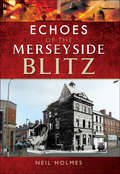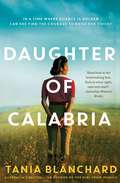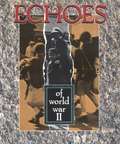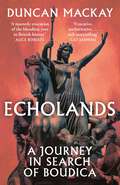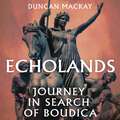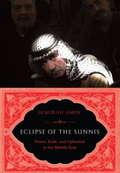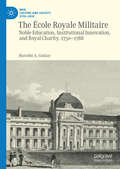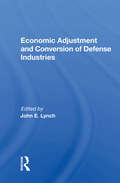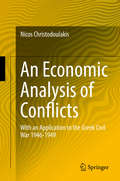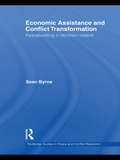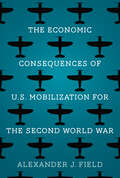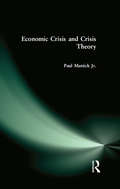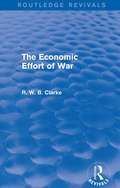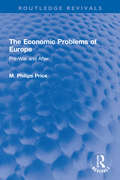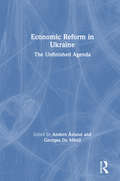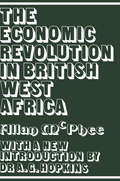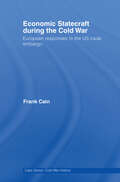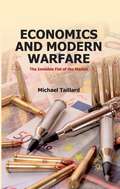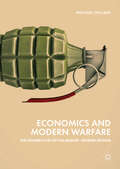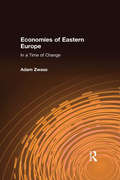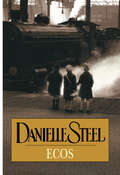- Table View
- List View
Echoes of the Merseyside Blitz (Echoes Of The Blitz Ser.)
by Neil HolmesMerseyside has a long and varied history, one which its sons and daughters are justifiably proud. It has come through many struggles, but perhaps its darkest hour was the air raids that were launched against it in 1940 and 1941. Around 4,000 people lost their lives and many prominent buildings and houses were destroyed or damaged beyond repair. All of this occurred in the space of just 18 months, a period which changed the face of the region irrevocably. Using a variety of new sources Echoes of the Merseyside Blitz draws together a timeline of the blitz for the whole region, showing at a glance what was happening on any given night during that period. Taking carefully selected photographs, Neil Holmes tells the story of Merseysides blitz through a series of ghost photographs, where historic wartime images are blended with their modern counterpart to create a fascinating window in to Merseysides past.
Echoes of War
by Tania BlanchardSet in Mussolini&’s Italy amid great upheaval, this is the story of one woman&’s determination to find her place in a world that men are threatening to tear apart. Another heart-rending novel inspired by a true story from Australia's bestselling author of The Girl from Munich. Calabria, Italy, 1936 In a remote farming village nestled in the mountains that descend into the sparkling Ionian Sea, young and spirited Giulia Tallariti longs for something more. While she loves her home and her lively family, she would much rather follow in her nonna&’s footsteps and pursue her dream of becoming a healer. But as Mussolini&’s focus shifts to the war in Europe, civil unrest looms. Whispers of war are at every corner and her beloved village, once safe from the fascist agenda of the North, is now in very real danger. Caught between her desire to forge her own path and her duty to her family, Giulia must draw on the passion in her heart and the strength of her conviction. Can she find a way to fulfill her dreams or will the echoes of war drown out her voice? PRAISE FOR TANIA BLANCHARD &‘Captures the intensity of a brutal and unforgiving war, successfully weaving love, loss, desperation and, finally, hope into a gripping journey of self-discovery.&’ Courier Mail &‘An epic tale, grand in scope … Packs an emotional punch that will reverberate far and wide.&’ Weekly Times &‘A tumultuous journey from order to bedlam, and from naive acceptance of the status quo to the gradual getting of political wisdom.&’ Sunday Age &‘An original and innovative take on the World War II genre that captures the hauntingly desperate essence of the war. Tania Blanchard has written yet another spectacular novel. Don&’t miss this.&’ Better Reading
Echoes of World War II
by Trish MarxPresents the stories of six people from different parts of the world whose childhoods were shaped by their experiences during World War II.
Echolands: A Journey in Search of Boudica
by Duncan MackayAlmost 2000 years ago, Boudica led the greatest rebellion Britain has ever seen. Within the space of a single blood-soaked year, she united the tribes to deliver blow after devastating blow to the Roman regime, culminating in a brutal, decisive battle.Archaeologist Duncan Mackay has spent a lifetime on the trail of Boudica. Beginning near his home in Norfolk, in the heart of Boudica's tribal territory, he embarks on a journey in the footsteps of Romans and Britons, exploring their villages, towns, forts and roads. The passage of two millennia has buried the world that Boudica knew, but Duncan finds that its echoes and physical traces still surround us - as long as you know where to look. The armies marched along the roads we still use, and died in their thousands in towns, cities and countryside where we still live today. The site of Boudica's last battle was long believed be lost to time, but the threads of the story all pull towards one remarkable, forgotten little corner of the English landscape.From the Breckland of Norfolk to the back streets of Colchester, from the remotest corner of Anglesey to the depths of the London Underground, Duncan takes us back two thousand years to retell the story of Britain's bloodiest year. Fusing ancient history, modern excavation, landscape exploration, and vivid reconstruction, Echolands weaves the long-lost tapestry of Boudica's war.
Echolands: A Journey in Search of Boudica
by Duncan MackayAn original, revelatory, enthralling narrative history of how Queen Boudica led the greatest rebellion Britain has ever seen. <p><p>Almost 2000 years ago, Boudica led the greatest rebellion Britain has ever seen. Within the space of a single blood-soaked year, she united the tribes to deliver blow after devastating blow to the Roman regime, culminating in a brutal, decisive battle. <p><p>Archaeologist Duncan Mackay has spent a lifetime on the trail of Boudica. Beginning near his home in Norfolk, in the heart of Boudica's tribal territory, he embarks on a journey in the footsteps of Romans and Britons, exploring their villages, towns, forts and roads. The passage of two millennia has buried the world that Boudica knew, but Duncan finds that its echoes and physical traces still surround us—as long as you know where to look. The armies marched along the roads we still use, and died in their thousands in towns, cities and countryside where we still live today. The site of Boudica's last battle was long believed be lost to time, but the threads of the story all pull towards one remarkable, forgotten little corner of the English landscape. <p><p>From the Breckland of Norfolk to the back streets of Colchester, from the remotest corner of Anglesey to the depths of the London Underground, Duncan takes us back two thousand years to retell the story of Britain's bloodiest year. Fusing ancient history, modern excavation, landscape exploration, and vivid reconstruction, Echolands weaves the long-lost tapestry of Boudica's war. <p>(P) 2023 Hodder & Stoughton Limited
Eclipse: The Last Days of the CIA
by Mark PerryExplains events in Nicaragua and negotiations with Noriega.
Eclipse of the Sunnis: Power, Exile, and Upheaval in the Middle East
by Deborah AmosAn award-winning NPR correspondent illuminates the flipside of the Shia revival?the dislocation and destabilization of the Sunni Muslims?and its impact on the Middle East
The École Royale Militaire: Noble Education, Institutional Innovation, and Royal Charity, 1750-1788 (War, Culture and Society, 1750 –1850)
by Haroldo A. GuízarThis book explores the Paris Ecole Militaire as an institution, arguing for its importance as a school that presented itself as a model for reform during a key moment in the movement towards military professionalism as well as state-run secular education. The school is distinguished for being an Enlightenment project, one of its founders publishing an article on it in the Encyclopédie in 1755. Its curriculum broke completely with the Latin pedagogy of the dominant Jesuit system, while adapting the legacy of seventeenth-century riding academies. Its status touches on the nature of absolutism, as it was conceived to glorify the Bourbon dynasty in a similar way to the girls’ school at Saint Cyr and the Invalides. It was also a dispensary of royal charity calculated to ally the nobility more closely to royal interests through military service. In the army, its proofs of nobility were the model for the much debated 1781 Ségur decree, often described as a notable cause of the French Revolution.
Economic Adjustment And Conversion Of Defense Industries
by John E. LynchDefense plant cutbacks and military base closures have affected hundreds of U.S. communities during the past twenty-five years. Tracing the recovery of four communities after large defense plant cutbacks and of one hundred communities after military base closures, the contributors analyze the transition from the production of military to civilian goods. The contributors examine the market potential of reusing defense industrial plants to produce civilian products within the one- to two-year period called for by economic conversion proponents, showing that the complex process needed to develop, test, and market an entirely new product requires a minimum of five years. They also review the wide range of economic development techniques available at the state and local level, conversion approaches in Western Europe, programs for displaced workers, and reasons why the economic conversion approach has failed to attract public support in the United States. The case studies are used to formulate an integrated, composite approach for coping with plant closures and major employment dislocations. Stressing the in portance of community-based economic adjustment activities, this book will be valuable to all concerned with mitigating the effects of military and civilian plant closures.
An Economic Analysis of Conflicts: With an Application to the Greek Civil War 1946-1949
by Nicos ChristodoulakisThis book provides a quantitative framework for the analysis of conflict dynamics and for estimating the economic costs associated with civil wars. The author develops modified Lotka-Volterra equations to model conflict dynamics, to yield realistic representations of battle processes, and to allow us to assess prolonged conflict traps. The economic costs of civil wars are evaluated with the help of two alternative methods: Firstly, the author employs a production function to determine how the destruction of human and physical capital stocks undermines economic growth in the medium term. Secondly, he develops a synthetic control approach, where the cost is obtained as the divergence of actual economic activity from a hypothetical path in the absence of civil war. The difference between the two approaches gives an indication of the adverse externalities impinging upon the economy in the form of institutional destruction. By using detailed time-series regarding battle casualties, local socio-economic indicators, and capital stock destruction during the Greek Civil War (1946-1949), a full-scale application of the above framework is presented and discussed.
Economic Assistance and Conflict Transformation: Peacebuilding in Northern Ireland (Routledge Studies in Peace and Conflict Resolution)
by Sean ByrneThis book examines the role of economic aid in the management and resolution of protracted ethnic conflicts, focusing on the case study of Northern Ireland. The book describes the results of a study of the role of economic aid within Northern Ireland, through the viewpoints of citizens collected in an opinion poll as well as community group leaders whose projects received funding, funding-agency civil servants and development officers. The study explains the importance of economic and social development in promoting cross-community contact as well as within single-identity communities, and the need for a multitrack intervention approach to transform the conflict in Northern Ireland. It makes an important contribution to our understanding of how economic assistance impacts on a divided society with a history of protracted violence and provides important perspectives on the "peace through development" idea. One of the key unanswered questions relating to economic aid and preventing future violence is that of the significance of external economic aid in building peace after violence. By examining the respondents’ political imagery, this book expands on existing work on economic aid and peace building in other societies coming out of violence. Northern Ireland’s changing social-economic and political context reflects the fact that economic aid and sustainable economic development is a cornerstone of the peacebuilding process. The goal of the book is to provide a foundational knowledge base for students and practitioners about the role of economic aid in building the peace dividend in post-accord societies. The book will be of great interest to students of conflict resolution, peacebuilding, Irish politics, peace and conflict studies, and politics and IR in general.
The Economic Consequences of U.S. Mobilization for the Second World War
by Alexander J. FieldA reminder that war is not always, or even generally, good for long-term growth Many believe that despite its destructive character, war ultimately boosts long‑term economic growth. For the United States this view is often supported by appeal to the experience of the Second World War, understood as a triumph of both production and productivity. Alexander Field shows that between 1941 and 1945 manufacturing productivity actually declined, depressed by changes in the output mix and resource shocks from enemy action, including curtailed access to natural rubber and, on the Eastern Seaboard, petroleum. The war forced a shift away from producing goods in which the country had a great deal of experience toward those in which it had little. Learning by doing was only a partial counterbalance to the intermittent idleness and input hoarding that characterized a shortage economy and dragged down productivity. The conflict distorted human and physical capital accumulation and once it ended, America stopped producing most of the new goods. The war temporarily shut down basic scientific research and the ongoing development of civilian goods. U.S. world economic dominance in 1948, Field shows, was due less to the experience of making war goods and more to the country&’s productive potential in 1941.
Economic Crisis and Crisis Theory
by Paul Mattick Jr.Keynesian economics claimed to have overcome the problem of economic depressions. However, as Mattick argues that crises are inherent within capitalism and that neither the market nor Keynesianism can stop "the steady deterioration of the economy". Written in 1974, Economic Crisis and Crisis Theory is one of Mattick's most valuable contributions to the Marxist critique of political economy and radical theory in general.
The Economic Effort of War (Routledge Revivals)
by R. W. ClarkeThe course of economic events from the start of the Second World War satisfied no-one. The housewife was exasperated by the rise in food prices, thousands of workers faced unemployment, and businessmen were bewildered by the flood of regulations and decrees. In this book, first published in 1940, R. W. B. Clarke explores the economic challenges that the UK faced in coping with the war, and possible ways in which these challenges could be resolved or improved. The book is vital reading for students of modern history and economics.
The Economic Problems of Europe: Pre-War and After (Routledge Revivals)
by M. Philips PriceFirst Published in 1928 The Economic Problems of Europe presents a comprehensive overview of the economic and political transformation of Europe since the First World War. European and world problems often tend to be looked upon from the political, diplomatic, naval, or military aspect. Morgan Philips Price attempted to add the economic background and to show the connection between the political rearrangements since the First World War and the material needs of society, markets of the industrialist, the wages of the workman, and the loans of the bankers. He argued that with the growing internationalization of the world economy, the old map of the world is obsolete and the new one, if it is based on frontiers of finance and industry, will be something very different. This book is an essential read for scholars and researchers of economic history, war history, political economy, British economic history and European history.
Economic Reform in Ukraine: The Unfinished Agenda
by Anders Aslund Georges De MenilUkraine may have taken a "gradualist" approach to economic reform, but the results have been no better than in Russia. The editors have assembled the leading specialists on the Ukrainian economy, including officials from major Ukrainian and international economic institutions, to outline the major problems of the economy, analyze the initial phases of economic reform in Ukraine, assess their outcomes, and chart the way forward.
The Economic Revolution in British West Africa
by Allan McPheeOriginally published in 1926, McPhee's work was the first to establish a framework for understanding the economic development between 1820-1920 in British West Africa.
Economic Statecraft during the Cold War: European Responses to the US Trade Embargo (Cold War History)
by Frank CainDiscussing a rarely researched aspect of the Cold War, this volume uses new material to examine how the United States trade embargo on the Soviet Union and communist China severed relationships with Europe, particularly focusing on Great Britain. In the late 1940s, the US government stopped nearly all exports to the entire Sino-Soviet bloc in the belief that it would hinder the expansion of Soviet and Chinese military potential. To continue receiving the US Marshall Aid, European countries had to impose similar bans, but were reluctant because their trade links with the USSR and its satellite countries had existed for centuries. The US thereafter negotiated with Europe about what to include or exclude from the list of authorised goods, severely straining diplomatic relations. Economic Statecraft during the Cold War details these negotiations, casting new light on the ambivalent US-UK relationship and providing insights into the changing emphasis between the Republican and Democrat administrations on the key question of trade embargo, by explaining how the firm consistency in the application of the US policy over the succeeding decades of the Cold War was maintained. This book will be of much interest to all students and scholars of Cold War history, intelligence studies and international history in general.
Economics and Modern Warfare: The Invisible Fist of the Market
by M. TaillardBy referring to a handful of battles throughout history, a new form of military strategy is derived through the manipulation of supplies, capital, and markets. This book combines economic theory with applied analyses of military successes and failures, explaining them simply for audiences of all levels of interest.
Economics and Modern Warfare: The Invisible Fist of the Market
by Michael TaillardThis book demonstrates how economic tools have been used throughout history to accomplish goals of military conflict, how they can be used more effectively than traditional means of warfare in the modern era, and how we can derive a better understanding of economic strategy applicable not just to the military but also to market competition. This new edition includes a thorough updating of chapters on advances in our understanding of economic warfare and more recent examples, such as ISIS’s reliance on obtaining control over oil production facilities, North Korea’s nuclear program, and China’s emphasis on scientific research and technological innovation. This edition also features an entirely new chapter on the commercialization of the conflict over the region of Kashmir.
The Economics of World War I
by Stephen Broadberry Mark HarrisonThis unique volume offers a definitive new history of European economies at war from 1914 to 1918. It studies how European economies mobilised for war, how existing economic institutions stood up under the strain, how economic development influenced outcomes and how wartime experience influenced post-war economic growth. Leading international experts provide the first systematic comparison of economies at war between 1914 and 1918 based on the best available data for Britain, Germany, France, Russia, the USA, Italy, Turkey, Austria-Hungary and the Netherlands. The editors' overview draws some stark lessons about the role of economic development, the importance of markets and the damage done by nationalism and protectionism. A companion volume to the acclaimed The Economics of World War II, this is a major contribution to our understanding of total war.
The Economics of World War II
by Mark HarrisonThis book provides a new quantitative view of the wartime economic experiences of six great powers; the UK, the USA, Germany, Italy, Japan and the USSR. What contribution did economics made to war preparedness and to winning or losing the war? What was the effect of wartime experiences on postwar fortunes, and did those who won the war lose the peace? A chapter is devoted to each country, reviewing its economic war potential, military-economic policies and performance, war expenditures and development, while the introductory chapter presents a comparative overview. The result of an international collaborative project, the volume aims to provide a text of statistical reference for students and researchers interested in international and comparative economic history, the history of World War II, the history of economic policy, and comparative economic systems. It embodies the latest in economic analysis and historical research.
Economies of Eastern Europe in a Time of Change: In A Time Of Change
by Adam ZwassThe development and use of the atomic bombs at Hiroshima and Nagasaki number among the formative national experiences for both Japanese and Americans as well as for 20th-century Japan-US relations. This volume explores the way in which the bomb has shaped the self-image of both peoples.
Ecos (Best Seller (debolsillo) Ser.)
by Danielle SteelLa historia de tres generaciones de mujeres marcadas por sus pasiones y sentimientos y por la horrenda desesperación de la Primera Guerra Mundial. En el verano de 1915, durante la Primera Guerra Mundial, los Wittgenstein, patriarcas de una rica familia judía alemana, consiguen reunir a todos sus miembros para disfrutar juntos en Suiza de unos días lejos de la tragedia cotidiana de la guerra. Ninguno sospechaba que aquel verano iba a ser el último de una vida feliz, acomodada y sin problemas graves. Poco después, Beata, la hija mayor, cae irremediablemente en las redes del amor. Pero se trata de un amor prohibido con un oficial católico. Esta relación, que los dos amantes defienden frente a todos, terminará dividiendo a la familia. Dos décadas más tarde, Beata deberá enfrentarse con la aterradora amenaza que significa Hitler para sus seres queridos y sobre todo para su hija Amadea. Ecos invita al lector a compartir una experiencia cálida, emocionante e inolvidable. La crítica ha dicho... «Una historia conmovedora sobre el amor y la pérdida.» Booklist
Ecos
by Danielle SteelEn el verano de 1915, durante la Primera Guerra Mundial, los Wittgenstein, patriarcas de una rica familia judía alemana, consiguen reunir a todos sus miembros para disfrutar juntos en Suiza de unos días lejos de la tragedia cotidiana de la guerra. Ninguno sospecha que aquel verano iba a ser el último de una vida feliz, acomodada y sin problemas graves.Poco después, Beata, la hija mayor, cae irremediablemente en las redes del amor. Pero se trata de un amor prohibido con un oficial francés católico. Esta relación, que los dos amantes defienden frente a todos, terminará dividiendo a la familia. Dos décadas más tarde, Beata deberá enfrentarse con la aterradora amenaza que significa Hitler para sus seres queridos y sobre todo para su hija Amadea.Historia de tres generaciones de mujeres marcadas por sus pasiones y sentimientos, entre la sociedad europea más elegante y la horrenda desesperación de la guerra, Ecos invita al lector a compartir una experiencia cálida, emocionante e inolvidable.«Una historia conmovedora sobre el amor y la pérdida.»Booklist
